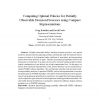43 search results - page 5 / 9 » Belief Selection in Point-Based Planning Algorithms for POMD... |
124
Voted
ICRA
2005
IEEE
15 years 4 months ago
2005
IEEE
Abstract— We present a simple randomized POMDP algorithm for planning with continuous actions in partially observable environments. Our algorithm operates on a set of reachable b...
100
click to vote
ATAL
2005
Springer
15 years 4 months ago
2005
Springer
Just as POMDPs have been used to reason explicitly about uncertainty in single-agent systems, there has been recent interest in using multi-agent POMDPs to coordinate teams of age...
AAAI
1996
1996
Computing Optimal Policies for Partially Observable Decision Processes Using Compact Representations
15 years 13 days ago
: Partially-observable Markov decision processes provide a very general model for decision-theoretic planning problems, allowing the trade-offs between various courses of actions t...
107
Voted
AAAI
2008
15 years 1 months ago
2008
In order to interact successfully in social situations, a robot must be able to observe others' actions and base its own behavior on its beliefs about their intentions. Many ...
107
click to vote
ATAL
2010
Springer
15 years 7 days ago
2010
Springer
Decentralized POMDPs provide an expressive framework for sequential multi-agent decision making. Despite their high complexity, there has been significant progress in scaling up e...

